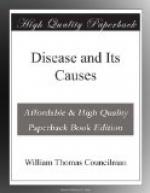Whether there is, entirely apart from all conditions affecting nutrition and the effect of injuries which disturb the usual cell activities, an actual senescence of the cells of the body is uncertain. In the presence of the many factors which influence the obvious diminution of cell activity in the old, it is impossible to say whether the loss of cell activity is intrinsic or extrinsic. The life of the plant cell seems to be immortal; it does not grow old. Trees die owing to accidents or because the tree acquires in the course of its growth a mass of tissue in which there is little or no life, and which becomes the prey of parasites. The growing tissue of a tree is comprised in a thin layer below the bark, and the life of this may seemingly be indefinitely prolonged by placing it in a situation in which it escapes the action of accidental injuries and decay, as by grafting on young trees. Where the nature of the dead wood is such that it is immune from parasites and decay, as in the case of the Sequoias, life seems to be indefinitely prolonged. The growing branches of one of these trees, whose age has been estimated with seeming accuracy at six thousand years, are just as fresh and the tree produces its flowers and fruit in the same degree as a youthful brother of one thousand years. Nor does old age supervene in the unicellular organisms. An amoeba assimilates, grows and multiplies just as long as the environment is favorable.
Old age in itself is seldom a cause of death. In rare cases in the very old a condition is found in which no change is present to which death can be attributed, all organs seem to share alike in the senescence. Death is usually due to some of the accidents of life, a slight infection to which the less resistant body succumbs, or to the rupture of a weakened blood vessel in the brain, or to more advanced decay in some organ whose function is indispensable. The causes and conditions of age have been a fertile source for speculation. Many of the hypotheses have been interesting, that of Metschnikoff, for example, who finds as a dominating influence in causing senescence the absorption of toxic substances formed in the large intestine by certain bacteria. He further finds that the cells of the body which have phagocytic powers turn their activity against cells and tissues which have become weakened. There may be absorption of injurious substances from the intestines which the body in a vigorous condition is able to destroy or to counteract their influence, and these may be more operative in the weaker condition of the body in the old. Phagocytes will remove cells which are dead and often cells which are superfluous in a part, but there is no evidence that this is ever other than a conservative process. Since it is impossible to single out any one condition to which old age is due, the hypothesis of Metschnikoff should have no more regard given it than the many other hypotheses which have been presented.




